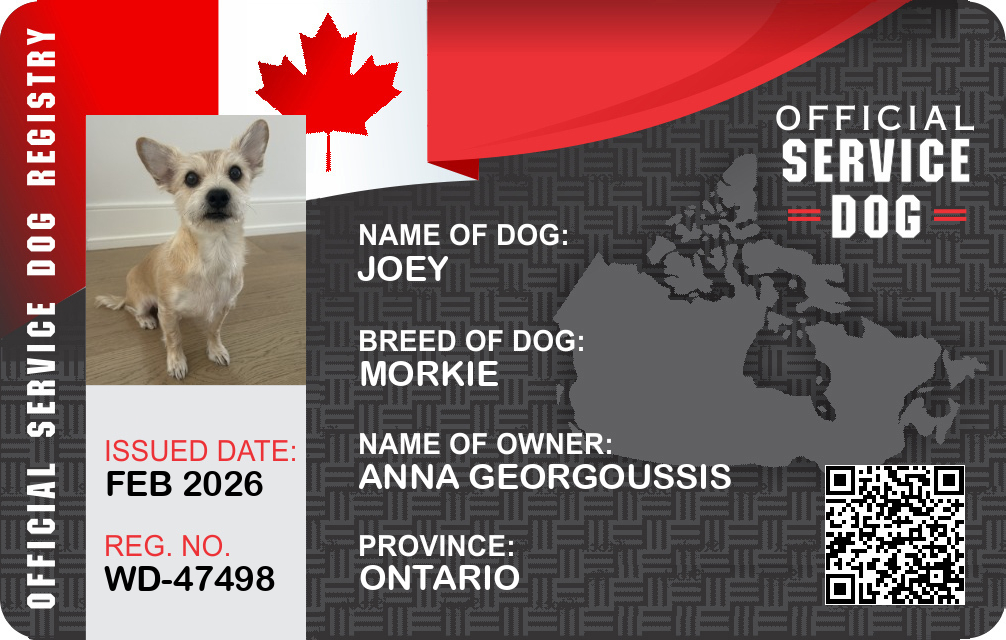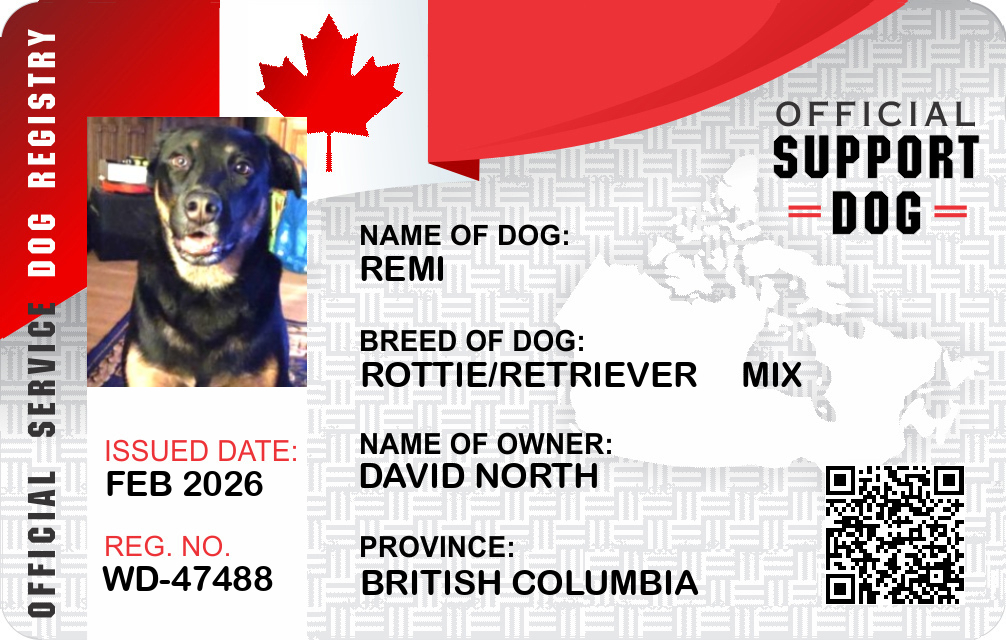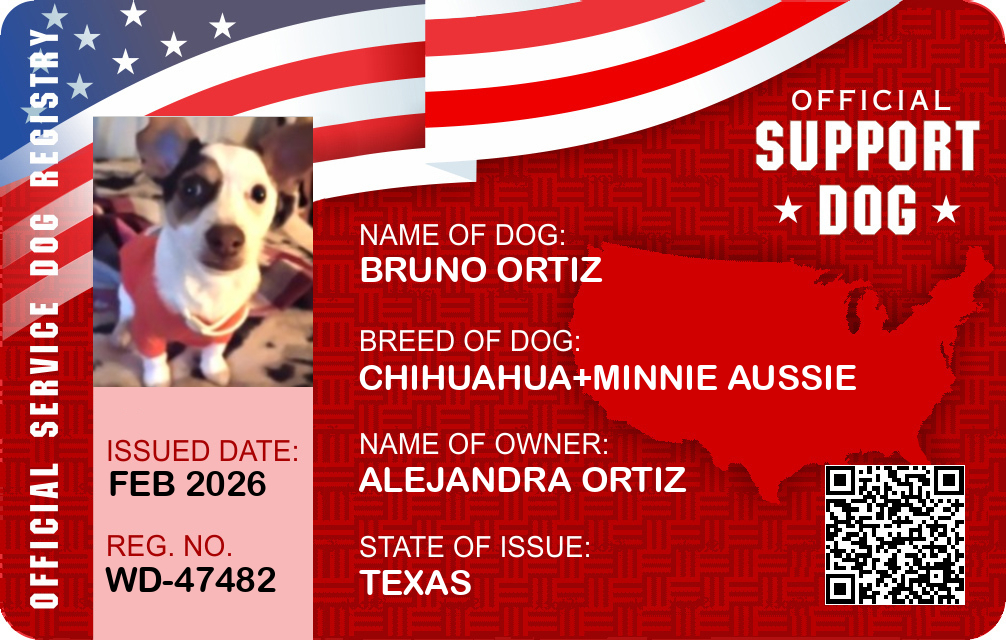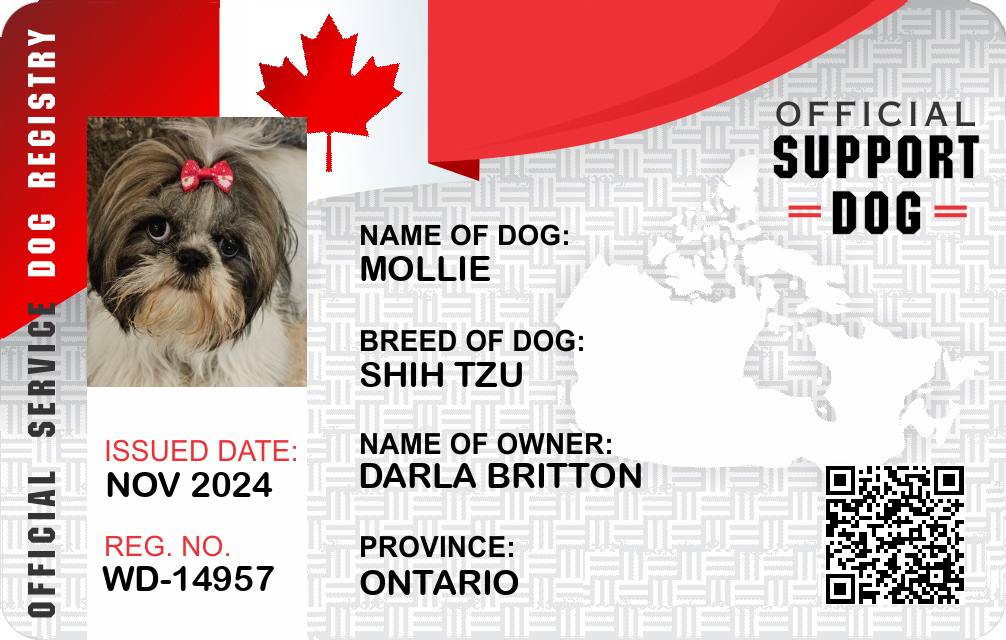Massachusetts Service Dog Laws
Get Your Documents
Example State Cards


Massachusetts, like many states, has a comprehensive set of laws governing the use and rights of service dogs and their handlers. These laws interact with federal regulations to protect the rights of individuals with disabilities. Understanding these laws is essential for service dog handlers, businesses, landlords, and the general public alike.
Overview of Service Dog and Legal Definitions in Massachusetts
What is a Service Dog?
A service dog is defined as a dog that has been individually trained to perform tasks or do work for a person with a disability. These tasks must be directly related to the individual’s disability. In Massachusetts, as in federal law, service dogs are not considered pets. The key concept here is that the dog is trained to perform specific tasks that aid the person with a disability, setting service dogs apart from pets and even other types of assistance animals.
How Service Dogs Differ from Other Types of Assistance Animals
While service dogs are specially trained for a specific individual, other assistance animals provide general emotional support or companionship. Emotional support animals (ESA) do not require specific task training, which means they do not receive the same rights to accommodation under Massachusetts laws as service dogs do. Another category includes therapy animals, which provide support to multiple people in clinical or therapeutic settings but are not covered under federal laws like the ADA.
Key Federal Laws Affecting Service Dogs (e.g., ADA, FHA, ACAA)
Federal laws play a significant role in the regulation of service dogs. The Americans with Disabilities Act (ADA) ensures service dogs can accompany their handlers in public spaces, even where pets are typically not allowed. The Fair Housing Act (FHA) mandates housing providers to make reasonable accommodations for service dogs, ensuring they or their handlers aren’t unfairly discriminated against due to pet policies. The Air Carrier Access Act (ACAA) governs the rights of service dogs in air travel, ensuring they can accompany their handlers in the cabin without extra fees, provided proper documentation and notice is given.
State-Specific Service Dog Laws in Massachusetts
Massachusetts state law complements federal laws by defining service dogs under its own jurisdiction. For instance, the state recognizes the right of service dog handlers to access public spaces, use public transportation, and be accommodated in housing. Additionally, Massachusetts law outlines penalties for misrepresenting an animal as a service dog, a measure intended to guard against the fraudulent use of service dog statuses.
Housing Rights and Responsibilities
Under the FHA and Massachusetts laws, landlords must permit any service dog to reside with its handler, even if the building has a “no pets” policy. Service dogs are exempt from pet fees or restrictions. Additionally, handlers are responsible for ensuring that their service dog does not cause property damage or nuisance.
Public Access and Accommodation
Service dog handlers in Massachusetts have the right to enter public spaces freely, including restaurants, museums, hotels, and government buildings, as mandated by the ADA. Denying access could lead to legal penalties. However, service dogs must remain under control at all times, and any bad behavior from the dog can legally justify removal from the premises.
Transportation and Travel Rules
Public transportation systems in Massachusetts, much like anywhere in the U.S., must accommodate service dogs without imposing extra charges. The Massachusetts Bay Transportation Authority (MBTA) provides clear guidance on this, emphasizing their compliance with ADA standards. Airlines also abide by the ACAA regulations, ensuring service dogs can travel in the cabin if given prior notice.
Employment and Workplace Considerations
The ADA, enforced in Massachusetts, mandates employers to provide reasonable accommodations for employees with disabilities, which includes allowing service dogs on-site. Employers can request documentation that details the necessity for the service dog but cannot ask for detailed medical records. Employers are encouraged to collaborate with employees to assess reasonable accommodations without causing undue hardship on the business.
Documentation, Requirements, and Processes in Massachusetts
Service Dog Documentation and Who Can Issue It
While Massachusetts does not have a specific state-issued service dog identification requirement, handlers may find it beneficial to carry documentation that verifies their dog’s training and purpose. Typically, credible information must derive from service dog organizations or professional trainers and describe the handler’s specific needs and the tasks the dog performs.
Landlord, Business, and Provider Verification Rules
Businesses and landlords in Massachusetts are limited in the questions they can ask regarding a service dog. They may inquire if the dog is required because of a disability and what tasks the dog has been trained to perform. They cannot request detailed medical information or demand a demonstration of the service dog’s skills.
Rights, Limitations, and Legal Risks
Rights Service Dog Handlers Have in Massachusetts
Service dog handlers in Massachusetts enjoy broad legal protections, including rights to equal housing opportunities, access to public spaces, and non-discrimination in employment. These rights emphasize respect and dignity for individuals with disabilities and the important role service dogs play in their lives.
Limits on Service Dog Protections and Common Restrictions
Despite robust protections, there are limitations. A service dog that is out of control or not housebroken can legally be excluded from a location. Additionally, the handler is responsible for the supervision and care of the service dog at all times, which includes alleviating distractions and ensuring the dog is clean and groomed.
Penalties for Fraud or Misrepresentation
Massachusetts imposes penalties on individuals falsely claiming a pet as a service dog. These misrepresentations undermine the utility and acceptance of legitimate service dogs. Violators face fines, community service, or both, stressing the significance of upholding true service dog standards.
Practical Guidance for Service Dog Handlers in Massachusetts
How to Qualify for a Service Dog Legitimately
Qualifying for a service dog in Massachusetts involves a combination of medical evaluation, assessment of needs, and enlisting the service of professional trainers. While documentation can be beneficial, the most crucial aspect is ensuring the dog’s training is specific to the handler’s needs.
How to Talk to Landlords, Airlines, and Employers
When engaging with landlords, airlines, or employers, service dog handlers should be prepared to succinctly and clearly state the service dog’s purpose and respond to permissible inquiries. Printed materials or identification from a recognized service dog organization can aid in these interactions.
Summary of Service Dog Laws in Massachusetts
In summary, Massachusetts service dog handlers are significantly protected through state-specific and federal laws. These legal frameworks ensure service dogs and their handlers can navigate daily life with dignity and the necessary support. It is crucial for handlers to understand and respect the obligations they have, including responsibility for their dog’s conduct and transparency in their need for service dog assistance.
Key Points for Service Dog Handlers in Massachusetts:
- Understand the Legal Definition: A service dog must be trained to perform tasks for a person with a disability.
- Federal and State Law Interaction: The ADA, FHA, and Massachusetts laws offer overlapping protections.
- Housing and Public Access Rights: Service dogs can enter public areas and reside in housing with no-extra pet fees.
- Limitations to Access Rights: Dogs behaving disruptively can be removed from premises.
- Documentation Needs: While not required by state law, documentation can aid in eliminating misunderstandings.
- Avoid Misrepresentation: Fraudulently representing a pet as a service dog can result in penalties.
- Proactive Communication: Be prepared and knowledgeable when discussing your rights with landlords, public service providers, and employers.
Understanding these laws ensures that service dog handlers can assert their rights effectively while maintaining the responsibilities and dignity that come with having a service animal.
Get Your Documents
Example State Cards













